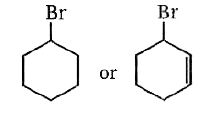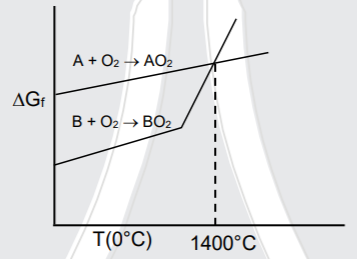Which cation in the given pair will be discharged first during electrolysis under similar conditions ?
Na+andMg2+
To determine which cation, Na⁺ or Mg²⁺, will be discharged first during electrolysis under similar conditions, we can follow these steps:
Step 1: Understand the Process of Electrolysis
During electrolysis, cations (positively charged ions) move towards the cathode (the negatively charged electrode) where they gain electrons and undergo reduction.
Step 2: Identify the Cations
The cations given are:
- Sodium ion (Na⁺)
- Magnesium ion (Mg²⁺)
Step 3: Determine the Reduction Reactions
At the cathode:
- The reduction reaction for Na⁺ is:
Na++e−→Na
- The reduction reaction for Mg²⁺ is:
Mg2++2e−→Mg
Step 4: Look Up Standard Electrode Potentials
The standard reduction potentials for these reactions are:
- For Na⁺: -2.71 V
- For Mg²⁺: -2.37 V
Step 5: Compare the Electrode Potentials
The more positive the reduction potential, the greater the tendency for the ion to be reduced. In this case:
- Na⁺ has a reduction potential of -2.71 V
- Mg²⁺ has a reduction potential of -2.37 V
Since -2.37 V is less negative than -2.71 V, Mg²⁺ has a higher reduction potential.
Step 6: Conclusion
Since Mg²⁺ has a higher reduction potential than Na⁺, it will be discharged first during electrolysis.
Final Answer: Mg²⁺ will be discharged first during electrolysis.
---
During electrolysis, cations (positively charged ions) move towards the cathode (the negatively charged electrode) where they gain electrons and undergo reduction.
The cations given are:
- Sodium ion (Na⁺)
- Magnesium ion (Mg²⁺)
At the cathode:
- The reduction reaction for Na⁺ is:
Na++e−→Na
- The reduction reaction for Mg²⁺ is:
Mg2++2e−→Mg
The standard reduction potentials for these reactions are:
- For Na⁺: -2.71 V
- For Mg²⁺: -2.37 V
The more positive the reduction potential, the greater the tendency for the ion to be reduced. In this case:
- Na⁺ has a reduction potential of -2.71 V
- Mg²⁺ has a reduction potential of -2.37 V
Since Mg²⁺ has a higher reduction potential than Na⁺, it will be discharged first during electrolysis.
Topper's Solved these Questions
- ELECTROLYSISBOOK - ICSECHAPTER - ELECTROLYSISEXERCISE - QUESTION FOR PRACTICE ON EXAMINATION PATTERN
39 Videos
- ELECTROLYSISBOOK - ICSECHAPTER - ELECTROLYSISEXERCISE - QUESTION
3 Videos
- ELECTROLYSISBOOK - ICSECHAPTER - ELECTROLYSISEXERCISE - QUESTIONS (fill in the blanks )
1 Videos
- CHEMISTRY-2015BOOK - ICSECHAPTER - CHEMISTRY-2015EXERCISE - SECTION-II (40 Marks) Attempt any four questions from this Section.
49 Videos
- METALLURGYBOOK - ICSECHAPTER - METALLURGYEXERCISE - UNIT TEST PAPER 6 - Metallurgy (Select the correct answer from the list A,B,C & given in each statement.)
5 Videos
Similar Questions
Knowledge Check
Among the given pairs, in which pair first compound reacts faster than second compound inSN1 reaction ?
ACH3−CH2−CH2−CH2−Br or CH3−CH2-CH∣Br−CH3BCH3−CH3∣C∣CH3−CH2−CH2 or CH3−C∣BrH−CH3∣CH−CH3C DCH3−CH3∣C∣Br−CH3 or CH3−CH3∣C∣I−CH3
DCH3−CH3∣C∣Br−CH3 or CH3−CH3∣C∣I−CH3
Which cation in the given pair will be discharged first during electrolysis under similar conditions ? Fe2+andZn2+
View SolutionWhich cation in the given pair will be discharged first during electrolysis under similar conditions ? Fe2+andCu2+
View SolutionWhich cation in the given pair will be discharged first during electrolysis under similar conditions ?
H+andCu2+
View SolutionWhich of the following pairs of gases will have identical rate of effusion under similar conditions?
View SolutionWhich of the following pair of gases will have same rate of diffusion under similar conditions?
View SolutionSelect the correct answer from the list given in brackets :
An aqueous electrolyte consists of the ions mentioned in the list, the ion which could be discharged most readily during electrolysis. [Fe2+,Cu2+,Pb2+,H+]
View SolutionA can reduce BO2 under which conditions.

View Solution
